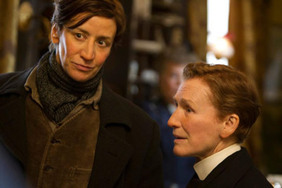 Janet McTeer and Friend
Janet McTeer and Friend Is the glass half empty or half full?
I'm going to go with half full, because there is a pretty spot-on depiction of a lesbian butch in the film. And a working-class butch,at that. Not addicted, self-hating, or self-destructive. Comfortable in her own skin, happily married and living in a cozy home.... Sassy, self-confident, compassionate, helpful to a sister in need. Does not die. Yep, nicely half-full. Janet McTeer knocking it out of the park.
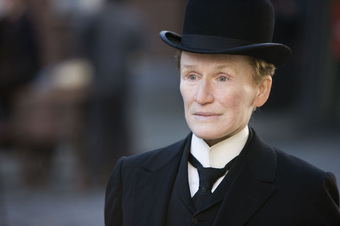 Glenn Close playing a prissy gay male stereotype.
Glenn Close playing a prissy gay male stereotype. If, however, I were to focus on the title role, Albert Nobbs... well, I'm afraid that's the "half-empty" part. And it's too bad, because this was apparently Glenn Close's project. In 1982, Close was in a stage production where she first performed the role. This was an adaptation of a short story by Irish author George Moore. She had a dream of making it into a film, which she worked toward for fifteen years. I wish I could say something nice about her portrayal.
Well, I can. It's not her fault. Someone else wrote the story. She plays a survivor of a gang rape, who has adopted male drag in order to secure better employment and (implied) indemnity from more assault. She appears to be in a freeze state of PTSD... either that, or arrested development. She has a nervous breakdown over a flea, nearly passes out at the sight of another woman's breasts, and (spoiler alert) has a heart attack over the excitement of a fist fight.
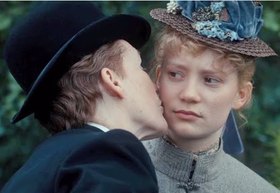 Eeeeuuuuwww
Eeeeuuuuwww There is a completely incoherent scene where the butch and Nobbs put on women's clothing (from the turn-of-the -century) and run along the beach. Nobbs is weeping with liberation. The metaphor is completely misguided, in my opinion, because it is their male clothing that has liberated them both. The female clothing signifies "other," subordinate status, sexual prey, economic dependence, and--as Nobbs trips and falls in the sand--serious literal as well as figurative challenges to mobility.
And while we're on half-empty... the film depicts both Nobbs and then later the butch character sexually objectifying a femmy (and snotty) servant in the hotel where they work. Both of them are not above exploiting her out-of-wedlock motherhood and the stigma that goes with it, to pressure her into partnership with them. One might make the case that the glass is half-full in that they are chivalrously willing to come to her rescue. I see it as half-empty as the woman, clearly in love with another person (a man), is being pressured to prostitute herself in a coerced marriage for the sake of the baby. Not cool.
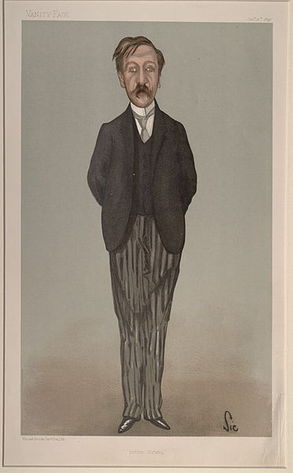 The author of "The Singular Life of Albert Nobbs"
The author of "The Singular Life of Albert Nobbs" George Moore attended a Catholic boarding school in England where he was the youngest of 150 boys. Not surprisingly, he had a breakdown and was sent home.When he returned, he refused to study the assigned subjects and was sent home for good. Later on, he made a career writing about prostitution, extramarital sex and lesbianism. According to Wikipedia, "Moore was believed by some to be impotent and was described as 'one who told but didn't kiss.'"
Gertrude Stein wrote about George in her Autobiography of Alice B. Toklas. She describes him as "a very prosperous Mellin's Food baby." [See Mellin Food ad below.]
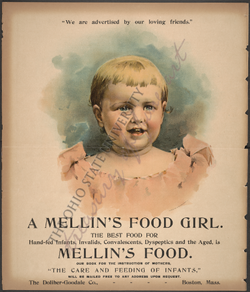 A Mellin Food Baby
A Mellin Food Baby You know what? George is half-full. He appears to have been quite a rebel, defying his school, going with a disreputable publisher, rejecting the church, taking part in the Irish Literary Revival, and disinheriting his brother...I'm going to give him a pass for his appropriation of "passing women."
So, go see the film. Appreciate that Close is opening territory for women. And then enjoy every second of McTeer's remarkable performance.
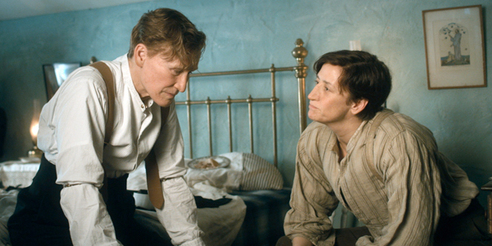 "It's not fair... I'm getting all the press, but you're getting all the girls!"
"It's not fair... I'm getting all the press, but you're getting all the girls!" 
 RSS Feed
RSS Feed
